Stay ahead of the AI revolution.


How to Write a Research Title: A Step-by-Step Guide
A research title is the first thing that readers will see when they come across your study. It is essential to craft a title that is informative, concise, and accurately reflects the content of your research. A good research title can attract readers to your work, while a poorly crafted title can lead to a reduced readership. In this article, we will guide you through the process of writing an effective research title step-by-step.
Understanding the Importance of a Research Title
Research is a critical component of the scientific process, and titles play a significant role in conveying research results to the community. A well-designed research title can catch the reader's attention, communicating succinctly the content and scope of your study. As such, research titles serve to attract readers to your work, increase its visibility, and help establish your research as a valuable and relevant contribution to the field.
Why a Good Research Title Matters
Studies have shown that the title of a research paper can influence how readers perceive its content, the author's reputation, and ultimately the paper's impact. A carefully crafted research title can attract the attention of those who would benefit most from the research presented in the paper, increasing the likelihood that it will be read, cited, and shared. On the other hand, a poorly constructed title can make an otherwise excellent research study invisible to its intended audience.
For example, imagine you have conducted a groundbreaking study on the effects of climate change on marine ecosystems. If you title your paper "Effects of Climate Change on Marine Ecosystems," your study may get lost in a sea of other papers with similar titles. However, if you title your paper "Rising Ocean Temperatures Threaten the Survival of Coral Reefs," you may catch the attention of marine biologists, conservationists, and policymakers who are interested in the specific issue you are addressing.
Characteristics of an Effective Research Title
Effective research titles should accurately reflect the content of the study and be concise and informative. They should be written in language that is accessible to the audience and avoid jargon and technical language. Additionally, effective titles should be specific, descriptive, and use keywords that signal to search engines and databases the main topic areas of the work.
When crafting your research title, consider the following questions:
- What is the main focus of your study?
- What are the key variables or concepts you are exploring?
- What is the scope of your study?
- What is the significance of your study?
Answering these questions can help you create a title that accurately reflects the content of your study and catches the attention of your target audience.
Identifying Your Research Topic
Before you can start crafting a research title, you need to identify the main topic areas of your research. This step will help you select the most critical keywords to include in the title and understand the broader context of your research.
Brainstorming Ideas
Brainstorming is an excellent way to generate ideas for research titles. You can start by writing down all the keywords related to your research, and then use these concepts to formulate a title. Try to come up with multiple options and evaluate each one based on its ability to reflect the content of the study and grab the reader's attention.
Narrowing Down Your Focus
Once you have a list of potential topics, it is time to narrow down your focus. You can do this by focusing on the most critical aspects of your research, identifying the trends and patterns that emerge from your data, or emphasizing the novelty and significance of your findings.
Components of a Strong Research Title
Clarity and conciseness.
Effective research titles should be clear and concise. This means using language that is accessible to the intended audience, avoiding jargon and technical language, and summarizing the main purpose of the study in a few words.
Accuracy and Specificity
Research titles should be as accurate and specific as possible. This means using specific terms that accurately reflect the content of the study and avoiding overly broad or ambiguous language.
Use of Keywords
Keywords are essential components of research titles. They help signal to search engines and databases the main topic areas of the work and help establish the relevance of the research. You should use keywords that accurately reflect the main topic areas of your research and provide context for the study.
Tips for Crafting the Perfect Research Title
Keep it simple and straightforward.
A good research title should be easy to read and understand. Avoid complex language or overly long titles that may confuse or turn off potential readers.
Avoid Jargon and Abbreviations
While technical language may be necessary in some of the study's content, it is essential to avoid using jargon or abbreviations in your research title. Doing so may confuse readers and diminish the relevance of your work.
Use Active Voice
Active voice is preferred in research titles as it emphasizes the subject of the study over the actions taken to perform it. Active voice also makes the title more engaging and easier to read.
Examples of Good and Bad Research Titles
Analyzing effective research titles.
Effective research titles are usually brief, descriptive, and use relevant keywords. Good titles will often pique the reader's curiosity and be memorable, while bad titles can confuse the reader or be too broad.
Common Mistakes to Avoid
Some common mistakes to avoid when crafting research titles include choosing vague, overly broad, or lengthy titles, using technical jargon or acronyms out of context, or using too many keywords. Additionally, titles should be revised carefully, and grammatical errors and typos should be avoided.
ChatGPT Prompt for Writing a Research Title
Chatgpt prompt.
Please create a concise and specific title for a research project that accurately reflects the subject matter, scope, and purpose of your investigation. Your title should be informative, engaging, and clearly convey the main focus of your study.
[ADD ADDITIONAL CONTEXT. CAN USE BULLET POINTS.]
When crafting a research title, it is essential to keep in mind its role in communicating the purpose and scope of your work to your intended audience. A good research title can increase the visibility and accessibility of your research, while a poorly constructed title can make it difficult, if not impossible, to engage your intended audience. By following the steps outlined in this article, you can craft a research title that is informative, concise, and effective.
Recommended Articles
How to write a theme: a step-by-step guide, how to write a preface: a step-by-step guide, feeling behind on ai, get the latest ai.

Get Your Free ChatGPT Training!

ChatGPT: Zero to Power User Cheat Sheet
- Top AI tools to use at work.
- Prompt frameworks.
- What NOT to use ChatGPT for.
Free AI Course for Professionals
Why 400,000+ professionals use the neuron to have an edge over peers at work.
- Privacy Policy

Home » Research Paper Title – Writing Guide and Example
Research Paper Title – Writing Guide and Example
Table of Contents

Research Paper Title
The title of a research paper is the first thing readers see, serving as a window into the study’s purpose, scope, and content. A well-crafted title grabs attention, reflects the main focus of the research, and helps readers determine if the paper is relevant to their interests. Writing a strong research paper title is essential for effectively communicating the study’s significance and attracting the right audience.
Importance of a Research Paper Title
A well-chosen research paper title:
- Attracts Attention : A catchy, descriptive title piques readers’ interest and encourages them to read further.
- Reflects Content : The title should accurately represent the study’s focus, variables, and findings.
- Improves Discoverability : Using relevant keywords in the title helps increase the paper’s visibility in search engines and academic databases.
- Establishes Scope : The title provides a concise overview, guiding readers on what to expect from the paper.
Characteristics of an Effective Research Paper Title
An effective research paper title should be:
- Descriptive and Specific : Clearly convey the study’s focus and main findings without being too vague.
- Concise : Avoid unnecessary words; keep the title clear and to the point.
- Informative : Include relevant information about the topic, research method, or population studied.
- Attention-Grabbing : Choose engaging language to make the title stand out.
- Keyword-Rich : Use relevant terms to improve searchability and increase visibility.
Writing Guide for Research Paper Titles
Step 1: identify key elements of the study.
Consider the main components of your study, including:
- Research Topic : The general subject or field of study (e.g., mental health, climate change).
- Variables : Key factors or concepts studied (e.g., social media use, anxiety levels).
- Research Method : The approach or methodology used (e.g., survey, experiment).
- Population : The specific group studied (e.g., college students, healthcare professionals).
- Main Findings : Any significant results that can add interest or specificity to the title.
Example : If the study examines the impact of social media on anxiety among college students using a survey, these elements will help shape a relevant title.
Step 2: Decide on the Title Type
Titles can be structured in various ways, each serving different purposes. Common title types include:
- Example : “Social Media Use and Anxiety Among College Students”
- Example : “Increased Social Media Use Correlates with Higher Anxiety Levels in College Students”
- Example : “Does Social Media Use Contribute to Anxiety in College Students?”
- Example : “Social Media and Mental Health: Exploring the Link Between Usage and Anxiety Among College Students”
Step 3: Incorporate Keywords
Choose keywords that represent the study’s topic, method, and variables. Keywords improve discoverability in academic databases and search engines, helping readers find your paper.
Example Keywords : Social media, anxiety, college students, mental health, survey.
Step 4: Keep the Title Concise and Avoid Jargon
A research paper title should generally be no longer than 12-15 words, depending on the journal’s guidelines. Avoid technical jargon or overly complex language that could confuse readers. Instead, aim for clarity and precision.
Example : Instead of “An Examination of the Correlation Between Digital Social Platforms and Increased Psychological Distress in Undergraduate Populations,” use “Social Media Use and Anxiety Among College Students.”
Step 5: Revise for Clarity and Impact
After drafting the title, review it to ensure it is clear, engaging, and accurately represents the study. Test the title’s impact by considering if it would capture your attention as a reader.
Example : If the initial draft title is “Social Media Use and Anxiety in College Students,” a revised version could be “Social Media Use Linked to Higher Anxiety Levels Among College Students,” which is more engaging.
Examples of Effective Research Paper Titles
- Example : “The Relationship Between Sleep Quality and Academic Performance Among High School Students”
- Why It Works : This title is clear, specific, and informs readers of the main variables and population studied.
- Example : “Mindfulness Training Reduces Stress and Improves Focus in Healthcare Professionals”
- Why It Works : It states the main finding, which makes it immediately interesting and relevant to readers.
- Example : “Can Green Spaces Improve Urban Residents’ Mental Health?”
- Why It Works : The question format engages readers and suggests an exploration of a relevant issue.
- Example : “Physical Activity and Mental Health: Examining the Impact of Exercise on Depression and Anxiety Symptoms”
- Why It Works : The main title establishes the topic, while the subtitle adds detail, making it clear and informative.
Tips for Writing a Research Paper Title
- Use Active Language : Choose active and descriptive words to make the title more engaging. For example, instead of “An Investigation of Social Media Effects on Anxiety,” use “Social Media Use Increases Anxiety Among Adolescents.”
- Avoid Redundancy : Avoid words that don’t add meaning (e.g., “A Study on” or “An Investigation into”). Go directly to the main points.
- Align with Journal Requirements : Check the target journal’s guidelines for title length, format, and style. Some journals may require specific wording or have character limits.
- Avoid Ambiguity : Make sure the title conveys a clear idea of what the paper covers, avoiding vague terms like “Effects on Health” without specifying which health outcomes are studied.
- Reflect the Study’s Tone : Ensure the title reflects the study’s approach (e.g., “Exploring,” “Investigating,” or “Assessing” for qualitative studies; “Comparing,” “Measuring,” or “Examining” for quantitative studies).
Common Pitfalls to Avoid
- Overly Broad Titles : A broad title may be uninformative and fail to attract specific readers. Aim for precision in the variables, population, and context.
- Technical Jargon : Avoid specialized terms that might be unfamiliar to a general audience unless they are essential to the title.
- Lengthy Titles : Long titles may appear cumbersome and discourage readership. Aim to keep titles concise and impactful.
- Vague Wording : Avoid titles that are too generic or vague, as they fail to communicate the study’s specific focus.
Example Titles and Revisions
- Revised Title : “Challenges in Online Learning: Factors Affecting Student Engagement in Remote Classrooms”
- Why It Works : The revised title specifies the context (online learning) and outcome (student engagement), making it clearer and more informative.
- Revised Title : “Air Pollution Exposure and Respiratory Health in Urban Children: A Longitudinal Study”
- Why It Works : The revised title specifies the environmental factor (air pollution), population (urban children), and method (longitudinal study), which provides more context.
- Revised Title : “Media Coverage and Public Opinion on Climate Change: A Comparative Study of the U.S. and Europe”
- Why It Works : The revised title provides specific information about the topic (climate change), variables (media coverage and public opinion), and context (U.S. and Europe).
Crafting an effective research paper title is essential for attracting the right audience and ensuring your paper’s impact. A good title is specific, concise, descriptive, and rich with relevant keywords to improve discoverability. By following this guide and refining your title to reflect the study’s focus, methods, and findings, you can create an engaging and informative title that captures readers’ interest and communicates the essence of your research.
- Creswell, J. W., & Creswell, J. D. (2018). Research Design: Qualitative, Quantitative, and Mixed Methods Approaches (5th ed.). SAGE Publications.
- Silvia, P. J. (2007). How to Write a Lot: A Practical Guide to Productive Academic Writing . American Psychological Association.
- Swales, J. M., & Feak, C. B. (2012). Academic Writing for Graduate Students: Essential Tasks and Skills (3rd ed.). University of Michigan Press.
- Day, R. A., & Gastel, B. (2011). How to Write and Publish a Scientific Paper (7th ed.). Greenwood.
- Glasman-Deal, H. (2010). Science Research Writing for Non-Native Speakers of English . Imperial College Press.
About the author
Muhammad Hassan
Researcher, Academic Writer, Web developer
You may also like

Research Paper Format – Types, Examples and...

Table of Contents – Types, Formats, Examples

Research Results Section – Writing Guide and...

Informed Consent in Research – Types, Templates...

Scope of the Research – Writing Guide and...

Research Paper Abstract – Writing Guide and...

5 Simple steps to write a good research paper title
Title, Abstract & keywords
Jayashree Rajagopalan

The first thing journal editors and reviewers will see upon receiving your research paper is the title, and will immediately form a view on what they should expect in your research paper. Moreover, the tile of your research paper is the only aspect that will be freely available to readers through search engines or indexing databases. It is therefore imperative that you write a clear, persuasive title that leads readers to know more about your research.
In a hurry? We have just the thing for you -- The following 3-minute interactive video will give you a quick summary of the 5 simple steps to follow while writing an effective research paper title.
You can also go on to read the rest of the article to deepen your understanding of which best practices to follow while writing a captivating, yet informative title for your research paper.
The following example will help you understand how you can go about writing a good title for your research paper in 5 simple steps:
Ask yourself these questions and make note of the answers:
- What is my paper about?

My paper studies whether X therapy improves the cognitive function of patients suffering from dementia.
- What techniques/ designs were used?
It was a randomized trial.
- Who/what is studied?
I studied 40 cases from six cities in Japan.
- What were the results?
There was an improvement in the cognitive function of patients.
Use your answers to list key words.
- Randomized trial
- 6 Japanese cities
- Improved cognitive function
Does your publication goal seem near yet too far?
Explore Researcher.Life to get the boost you need to achieve all your goals
Create a sentence that includes the key words you listed.
This study is a randomized trial that investigates whether X therapy improved cognitive function in 40 dementia patients from 6 cities in Japan; it reports improved cognitive function.
(Current length: 28 words)
Delete all unnecessary/ repetitive words and link the remaining.
This study is a randomized trial that investigates whether X therapy improved cognitive function in 40 dementia patients from 6 cities in Japan; it reports improved cognitive function Randomized trial of X therapy for improving cognitive function in 40 dementia patients from 6 cities in Japan
(Length of revised title: 18 words)
Delete non-essential information and reword the title.
Randomized trial of X therapy for improving cognitive function in 40 dementia patients from 6 cities in Japan reports improved cognitive function
Randomized trial of X therapy for improving cognitive function in 40 dementia patients
(Length of finalized title: 13 words)
Include a subtitle
X therapy improves cognitive function in 40 dementia patients: A randomized trial
(Title length: 12 words) Following the steps outlined above will help you arrive at an effective title for your research paper. Learn in depth how you can write a persuasive title for your manuscript with this course designed exclusively for researchers: How and how not to title your research paper - A handbook for authors
Related reading: The complete guide to writing a brilliant research paper

for this article
Published on: Nov 18, 2014
- Manuscript Title
You're looking to give wings to your academic career and publication journey. We like that!
Why don't we give you complete access! Create a free account and get unlimited access to all resources & a vibrant researcher community.
One click sign-in with your social accounts

Sign up via email
1536 visitors saw this today and 1210 signed up.
Subscribe to Manuscript Writing
Translate your research into a publication-worthy manuscript by understanding the nuances of academic writing. Subscribe and get curated reads that will help you write an excellent manuscript.
Confirm that you would also like to sign up for free personalized email coaching for this stage.
Related Reading

How to write an effective title and abstract and choose appropriate…

3 Basic tips on writing a good research paper title

A 10-step guide to make your research paper abstract more effective
5 Simple steps to write a good research paper title 3 min read
How to write an effective title and abstract and choose appropriate keywords 11 min read
"Love hormone" oxytocin could be used to treat cognitive disorders like Alzheimer's 5 min read
3 Basic tips on writing a good research paper title 4 min read
New protein function could be key in treating drug addiction and behavioral disorders 6 min read
Trending Searches
- Statement of the problem
- Background of study
- Scope of the study
- Types of qualitative research
- Rationale of the study
- Concept paper
- Literature review
- Introduction in research
- Under "Editor Evaluation"
- Ethics in research
Recent Searches
- Review paper
- Responding to reviewer comments
- Predatory publishers
- Scope and delimitations
- Open access
- Plagiarism in research
- Journal selection tips
- Editor assigned
- Types of articles
- "Reject and Resubmit" status
- Decision in process
- Conflict of interest

6 Important Tips on Writing a Research Paper Title
When you are searching for a research study on a particular topic, you probably notice that articles with interesting, descriptive research titles draw you in. By contrast, research paper titles that are not descriptive are usually passed over, even though you may write a good research paper with interesting contents. This shows the importance of coming up with a good title for your research paper when drafting your own manuscript.
Importance of a Research Title
The research title plays a crucial role in the research process, and its importance can be summarized as follows:

Why do Research Titles Matter?
Before we look at how to title a research paper, let’s look at a research title example that illustrates why a good research paper should have a strong title.
Imagine that you are researching meditation and nursing, and you want to find out if any studies have shown that meditation makes nurses better communicators. You conduct a keyword search using the keywords “nursing”, “communication”, and “meditation.” You come up with results that have the following titles:
- Benefits of Meditation for the Nursing Profession: A Quantitative Investigation
- Why Mindful Nurses Make the Best Communicators
- Meditation Gurus
- Nurses on the Move: A Quantitative Report on How Meditation Can Improve Nurse Performance
All four of these research paper titles may describe very similar studies—they could even be titles for the same study! As you can see, they give very different impressions.
- Title 1 describes the topic and the method of the study but is not particularly catchy.
- Title 2 partly describes the topic, but does not give any information about the method of the study—it could simply be a theoretical or opinion piece.
- Title 3 is somewhat catchier but gives almost no information at all about the article.
- Title 4 begins with a catchy main title and is followed by a subtitle that gives information about the content and method of the study.
As we will see, Title 4 has all the characteristics of a good research title.
Characteristics of a Good Research Title
According to rhetoric scholars Hairston and Keene, making a good title for a paper involves ensuring that the title of the research accomplishes four goals as mentioned below:
- It should predict the content of the research paper .
- It should be interesting to the reader .
- It should reflect the tone of the writing .
- It should contain important keywords that will make it easier to be located during a keyword search.
Let’s return to the examples in the previous section to see how to make a research title.
As you can see in the table above, only one of the four example titles fulfills all of the criteria of a suitable research paper title.
Related: You’ve chosen your study topic, but having trouble deciding where to publish it? Here’s a comprehensive course to help you identify the right journal .
Tips for Writing an Effective Research Paper Title
When writing a research title, you can use the four criteria listed above as a guide. Here are a few other tips you can use to make sure your title will be part of the recipe for an effective research paper :
- Make sure your research title describes (a) the topic, (b) the method, (c) the sample, and (d) the results of your study. You can use the following formula:
[ Result ]: A [ method ] study of [ topic ] among [ sample ] Example : Meditation makes nurses perform better: a qualitative study of mindfulness meditation among German nursing students
- Avoid unnecessary words and jargons. Keep the title statement as concise as possible. You want a title that will be comprehensible even to people who are not experts in your field. Check our article for a detailed list of things to avoid when writing an effective research title .
- Make sure your title is between 5 and 15 words in length.
- If you are writing a title for a university assignment or for a particular academic journal, verify that your title conforms to the standards and requirements for that outlet. For example, many journals require that titles fall under a character limit, including spaces. Many universities require that titles take a very specific form, limiting your creativity.
- Use a descriptive phrase to convey the purpose of your research efficiently.
- Most importantly, use critical keywords in the title to increase the discoverability of your article.

Resources for Further Reading
In addition to the tips above, there are many resources online that you can use to help write your research title. Here is a list of links that you may find useful as you work on creating an excellent research title:
- The University of Southern California has a guide specific to social science research papers: http://libguides.usc.edu/writingguide/title
- The Journal of European Psychology Students has a blog article focusing on APA-compliant research paper titles: http://blog.efpsa.org/2012/09/01/how-to-write-a-good-title-for-journal-articles/
- This article by Kristen Hamlin contains a step-by-step approach to writing titles: http://classroom.synonym.com/choose-title-research-paper-4332.html
Are there any tips or tricks you find useful in crafting research titles? Which tip did you find most useful in this article? Leave a comment to let us know!
- Hairston, M., & Keene, M. 2003. Successful writing . 5th ed. New York: Norton.
- University of Southern California. 2017. Organizing your social sciences research paper: choosing a title . [Online] Available at: http://libguides.usc.edu/writingguide/title
Thank you so much:) Have a nice day!
Thank you so much, it helped me.. God bless..
Thank you for the excellent article and tips for creating a research work, because I always forget about such an essential element as the keywords when forming topics. In particular, I have found a rapid help with the formation of informative and sound titles that also conforms to the standards and requirements.
I am doing a research work on sales girls or shop girls using qualititative method. Basicly I am from Pakistan and writing on the scenario of mycountry. I am really confused about my research title can you kindly give some suggestions and give me an approperaite tilte

Hi Zubair, Thank you for your question. However, the information you have provided is insufficient for drafting an appropriate title. Information on what exactly you intend to study would be needed in order to draft a meaningful title. Meanwhile, you can try drafting your own title after going through the following articles our website: https://www.enago.com/academy/top-10-tips-on-choosing-an-attractive-research-title/ , https://www.enago.com/academy/writing-a-good-research-title-things-to-avoid/ , https://www.enago.com/academy/write-irresistible-research-paper-title/ We would be happy to give you feedback and suggest changes if required. Did you get a chance to install our free Mobile App? https://www.enago.com/academy/mobile-app/ . Make sure you subscribe to our weekly newsletter https://www.enago.com/academy/subscribe-now/ .
thanks for helping me like this!!
Thank you for this. It helped me improve my research title. I just want to verify to you the title I have just made. “Ensuring the safety: A Quantitative Study of Radio Frequency Identification system among the selected students of ( school’s name ).
(I need your reply asap coz we will be doing the chap. 1 tomorrow. Thank u in advance. 🙂 )
I am actually doing a research paper title. I want to know more further in doing research title. Can you give me some tips on doing a research paper?
Hi Joan, Thank you for your question. We are glad to know that you found our resources useful. Your feedback is very valuable to us. You can try drafting your own title after going through the following articles on our website: https://www.enago.com/academy/top-10-tips-on-choosing-an-attractive-research-title/ , https://www.enago.com/academy/writing-a-good-research-title-things-to-avoid/ , https://www.enago.com/academy/write-irresistible-research-paper-title/
We would be happy to give you feedback and suggest changes if required. Did you get a chance to install our free Mobile App? https://www.enago.com/academy/mobile-app/ . Make sure you subscribe to our weekly newsletter https://www.enago.com/academy/subscribe-now/ .
That really helpful. Thanks alot
Thank you so much. It’s really help me.
Thanks for sharing this tips. Title matters a lot for any article because it contents Keywords of article. It should be eye-catchy. Your article is helpful to select title of any article.
nice blog that you have shared
This blog is very informative for me. Thanks for sharing.
nice information that you have shared
i’m found in selecting my ma thesis title ,so i’m going to do my final research after the proposal approved. Your post help me find good title.
I need help. I need a research title for my study about early mobilization of the mechanically ventilated patients in the ICU. Any suggestions would be highly appreciated.
Thank you for posting your query on the website. When writing manuscripts, too many scholars neglect the research title. This phrase, along with the abstract, is what people will mostly see and read online. Title research of publications shows that the research paper title does matter a lot. Both bibliometrics and altmetrics tracking of citations are now, for better or worse, used to gauge a paper’s “success” for its author(s) and the journal publishing it. Interesting research topics coupled with good or clever yet accurate research titles can draw more attention to your work from peers and the public alike. You can check through the following search results for titles on similar topics: https://www.google.com/search?q=early+mobilization+of+the+mechanically+ventilated+patients+in+the+icu&rlz=1C1GCEU_enIN907IN907&oq=&aqs=chrome.0.69i59.4920093j0j7&sourceid=chrome&ie=UTF-8 .
We hope this would be helpful in drafting an attractive title for your research paper.
Please let us know in case of any other queries.
I’ve been surfing online more than 3 hours these days, but I never found any interesting article like yours. It is lovely worth enough for me. In my opinion, if all website owners and bloggers made just right content material as you did, the internet will be much more helpful than ever before.
Wonderful article! We will bee linking to this particularly great post on our site. Keep up the good writing.
Wow that was odd. I just wrote an very long comment but after I clicked submit my comment didn’t show up. Grrrr… well I’m not writing all that over again. Anyhow, just wanted to say fantastic blog!
In case the topic is new research before you’re writing. And then to stand out, you end up being different.and be inclined to highlight yourself.
There are many free directories, and more paid lists.
To be honest your article is informative. I search many site to know about writing but I didn’t get the information I needed. I saw your site and I read it. I got some new information from here. I think some of your tips can be applied to those too! Thank you so very much for such informative and useful content.
Nice and well written content you have shared with us. thanks a lot!
Thanks for sharing these tips… Rockwide
Its helpful. a person can grab knowledge through it.
Rate this article Cancel Reply
Your email address will not be published.

Enago Academy's Most Popular Articles

- Reporting Research
Choosing the Right Analytical Approach: Thematic analysis vs. content analysis for data interpretation
In research, choosing the right approach to understand data is crucial for deriving meaningful insights.…

Comparing Cross Sectional and Longitudinal Studies: 5 steps for choosing the right approach
The process of choosing the right research design can put ourselves at the crossroads of…

- Career Corner
Unlocking the Power of Networking in Academic Conferences
Embarking on your first academic conference experience? Fear not, we got you covered! Academic conferences…

Research Recommendations – Guiding policy-makers for evidence-based decision making
Research recommendations play a crucial role in guiding scholars and researchers toward fruitful avenues of…

- AI in Academia
Disclosing the Use of Generative AI: Best practices for authors in manuscript preparation
The rapid proliferation of generative and other AI-based tools in research writing has ignited an…
Choosing the Right Analytical Approach: Thematic analysis vs. content analysis for…
Comparing Cross Sectional and Longitudinal Studies: 5 steps for choosing the right…
How to Design Effective Research Questionnaires for Robust Findings

Sign-up to read more
Subscribe for free to get unrestricted access to all our resources on research writing and academic publishing including:
- 2000+ blog articles
- 50+ Webinars
- 10+ Expert podcasts
- 50+ Infographics
- 10+ Checklists
- Research Guides
We hate spam too. We promise to protect your privacy and never spam you.
- Industry News
- Publishing Research
- Promoting Research
- Diversity and Inclusion
- Infographics
- Expert Video Library
- Other Resources
- Enago Learn
- Upcoming & On-Demand Webinars
- Open Access Week 2024
- Peer Review Week 2024
- Publication Integrity Week 2024
- Conference Videos
- Enago Report
- Journal Finder
- Enago Plagiarism & AI Grammar Check
- Editing Services
- Publication Support Services
- Research Impact
- Translation Services
- Publication solutions
- AI-Based Solutions
- Thought Leadership
- Call for Articles
- Call for Speakers
- Author Training
- Edit Profile
I am looking for Editing/ Proofreading services for my manuscript Tentative date of next journal submission:

Which among these would you prefer the most for improving research integrity?
How To Write A Research Paper
Research Paper Title

How to Write a Good Research Paper Title
11 min read
Published on: Jan 5, 2024
Last updated on: Oct 28, 2024

People also read
How to Write a Research Paper Step by Step
How to Write a Proposal For a Research Paper in 10 Steps
A Comprehensive Guide to Creating a Research Paper Outline
Types of Research - Methodologies and Characteristics
350+ Interesting Research Paper Topics to Get You Started
Interesting Psychology Research Topics & Ideas
Qualitative Research - Types, Methods & Examples
Understanding Quantitative Research - Definition, Types, Examples, And More
Research Paper Example - Examples for Different Formats
How To Start A Research Paper - Steps With Examples
How To Write a Literature Review for a Research Paper | Steps & Examples
Types of Qualitative Research Methods - An Overview
Understanding Qualitative vs. Quantitative Research - A Complete Guide
How to Cite a Research Paper in Different Citation Styles
Easy Sociology Research Topics for Your Next Project
200+ Outstanding History Research Paper Topics With Expert Tips
How To Write a Hypothesis in a Research Paper | Steps & Examples
How to Write an Introduction for a Research Paper - A Step-by-Step Guide
How to Write a Conclusion for a Research Paper in 3 Simple Steps
How to Write an Abstract For a Research Paper with Examples
How To Write a Thesis For a Research Paper Step by Step
How to Write a Discussion For a Research Paper | Objectives, Steps & Examples
How to Write the Results Section of a Research Paper - Structure and Tips
How to Write a Problem Statement for a Research Paper in 6 Steps
How To Write The Methods Section of a Research Paper Step-by-Step
How to Find Sources For a Research Paper | A Guide
Share this article
In scholarly writing, the title plays a subtle yet pivotal role. Ever wondered how a simple string of words can make or break a research paper's impact?
Your research paper's title serves as the initial point of contact for your reader, forming their first impression of your work. Therefore, careful consideration of your title is crucial.
There are fundamental principles to bear in mind: your title should be informative, attention-grabbing, and contextually fitting.
This guide provides a detailed view of these essential qualities, by looking at the steps to write a research paper title. We'll break down what makes a great title.
So let’s get started!
On This Page On This Page -->
What is Research Paper Title, and Why is it Important?
A research paper title is a concise and informative heading that encapsulates the main theme or focus of a research study. It serves as the first point of contact between the reader and the research paper, providing a peek into the purpose of the study.
It is important because the research paper title tells readers what the study is about almost instantly.
A good title not only grabs attention but also helps in finding the research online. It shows the professionalism of the study and makes it easier for everyone to understand and engage with the research.
So, a well-crafted title is like a guide that leads readers to the core of the research paper .
Characteristics of a Good Research Title
According to rhetoric scholars Hairston and Keene , creating an effective paper title involves achieving the goals outlined below:
- Content Preview: A good title gives a glimpse of the research content.
- Engagement Factor: An effective title sparks reader interest.
- Tone Alignment: It reflects the scholarly tone of the paper.
- Keyword Integration: Includes essential keywords for better searchability.
- Prioritize Clarity: Use clear, concise language for broad understanding.
- Embrace Conciseness: Keep titles brief, omitting unnecessary details.
- Ensure Specificity: Include unique details to distinguish the research.
With these 7 characteristics of a research title in mind, let's now explore the steps to craft an ideal research paper title.
How to Write a Research Paper Title in 5 Steps
In the following sections, we'll walk through a five-step process designed to help you create a title that is truly impressive.
Step 1: Define the Core Elements of Your Research
Before crafting your research paper title, it's essential to answer key questions about your study. These questions help you identify the main focus and key components of your research paper. Consider:
- Research Topic: What is the primary subject of your study?
- Research Problem or Question: What issue are you addressing, or what question are you seeking to answer?
- Methodology: What methods or approaches did you use in your research?
- Results/Findings: What are the main outcomes or results of your study?
Step 2: Identify Essential Keywords
Identify significant keywords related to your research paper. These terms will play a crucial role in creating a title that effectively communicates your study's focus.
Step 3: Constructing a Research Title Using Keywords
Combine the identified keywords into a concise and descriptive research paper title. Weave together the essential elements of your study while maintaining clarity and relevance.
The sentence above, describing the research on smoking cessation programs, is undoubtedly too lengthy for a research paper title . Therefore, the forthcoming steps will involve refining and succinctly polishing the title for clarity and conciseness.
Step 4: Develop a Working Research Title
To create a working title, remove elements that make it a complete sentence but keep everything important to the study. Delete unnecessary and redundant words not central to the research or likely excluded from a database search.
Original Working Title:
Refined Title:
Note: The goal is to shorten the title to 16 words or fewer, making it concise and effective for a research paper.
Step 5: Trim Unnecessary Words and Phrases
Remove any nonessential words and phrases from your title. The number of subjects studied and exact outcomes may not be crucial, and detailed methods can be omitted for conciseness. Focus on key terms for database search optimization.
Final Refined Title:

Adding a Research Paper Subtitle
If your title needs additional details about your methodology or sample, consider adding a subtitle after a colon.
Research Paper Title Examples
Let's start by examining research title examples suitable for students. We will explore the basic formats for research paper title pages, including MLA and APA styles.
Research Paper Title Page MLA
Title Page For A Research Paper APA Style

Scientific Paper Title
Here are 5 examples of research titles for scientific papers:
Tips on Formulating a Good Research Paper Title
When creating a title for your research paper, consider the following general tips to capture the reader's attention and effectively convey the purpose of your study:
- Summarize your research in the fewest possible words to maintain clarity and reader engagement.
- Incorporate essential keywords that researchers working in your field are likely to use.
- Use compelling and attention-grabbing language to make your title stand out.
- Ensure your title accurately captures the purpose of your research, conveying the central question or objective.
- Clearly define the scope of the study in the title, indicating the specific focus of your research.
- Consider phrasing your title in the form of a question if it enhances the intrigue and aligns with the nature of your research.
- Prioritize readability and clarity to make your title easily understandable for a broad audience.
- Optimize your title for search engines by including relevant keywords that researchers might use when seeking similar studies.
- Minimize the use of field-specific jargon that may alienate readers unfamiliar with your subject.
- Ensure the title summarizes the core findings or contributions of your research.
Research Paper Title Checklist
Here's a checklist table to guide you on how to write a research paper title:
In conclusion , writing an effective research paper title is a vital skill that demands accuracy, clarity, and engagement. Prioritize conciseness and specificity while ensuring relevance to the research content. Remember to integrate essential keywords for enhanced searchability.
If you find yourself struggling, fear not. CollegeEssay.org is here to assist. With a wealth of experience aiding scholars worldwide, our professional writing service ensures meticulously crafted titles that resonate with your research.
Connect with our research paper writing service for expert assistance – let us elevate your paper's impact and resonance.
Can abbreviations or acronyms be used in the research paper title?
While sparingly acceptable, it's advisable to initially use full terms in the title for clarity. Introduce abbreviations later in the paper to avoid potential confusion for readers unfamiliar with the terms.
Is it advisable to formulate the research paper title as a question?
Crafting the title as a declarative statement is preferable. It provides a clear indication of the study's main focus and findings, enhancing reader engagement and comprehension.
Should the research paper title be in sentence case or title case?
Follow the specific style guidelines recommended by your institution or the publisher. Some styles prefer sentence case (where only the first word and proper nouns are capitalized), while others recommend title case (where major words are capitalized). Consistency is key to maintaining a polished appearance.
Is it permissible to change the research paper title after submission?
Post-submission changes to the title may be challenging, so it's crucial to carefully finalize and review the title before submitting the paper to avoid complications in the publication process.
Is it beneficial to include specific keywords in the research paper title?
Yes, incorporating keywords relevant to your study increases the discoverability of your research. It helps search engines, databases, and readers quickly identify the core themes of your paper.
John K. (Research)
John K. is a professional writer and author with many publications to his name. He has a Ph.D. in the field of management sciences, making him an expert on the subject matter. John is highly sought after for his insights and knowledge, and he regularly delivers keynote speeches and conducts workshops on various topics related to writing and publishing. He is also a regular contributor to various online publications.
Need Help With Your Essay?
Also get FREE title page, Turnitin report, unlimited revisions, and more!
Keep reading

on 3 Purchases
Valid from 27th Nov to 1st Dec
Essay Services
- Argumentative Essay Service
- Descriptive Essay Service
- Persuasive Essay Service
- Narrative Essay Service
- Analytical Essay Service
- Expository Essay Service
- Comparison Essay Service
Writing Help
- Term Paper Writing Help
- Research Writing Help
- Thesis Help
- Dissertation Help
- Report Writing Help
- Speech Writing Help
- Assignment Help
Legal & Policies
- Privacy Policy
- Cookies Policy
- Terms of Use
- Refunds & Cancellations
- Our Writers
- Success Stories
- Our Guarantees
- Affiliate Program
- Referral Program
Disclaimer: All client orders are completed by our team of highly qualified human writers. The essays and papers provided by us are not to be used for submission but rather as learning models only.
- College Essay
- Argumentative Essay
- Expository Essay
- Narrative Essay
- Descriptive Essay
- Scholarship Essay
- Admission Essay
- Reflective Essay
- Nursing Essay
- Economics Essay
Assignments
- Term Papers
- Research Papers
- Case Studies
- Dissertation
- Presentation
- Editing Help
- Cheap Essay Writing
- How to Order
Research Paper Guide
Research Paper Title
Crafting a Winning Research Paper Title: A Complete Guide

People also read
Research Paper Writing - A Step by Step Guide
Research Paper Examples - Free Sample Papers for Different Formats!
Guide to Creating Effective Research Paper Outline
A Catalog of 300+ Research Paper Topics
Research Proposal Writing - A Step-by-Step Guide
How to Start a Research Paper - 7 Easy Steps
How to Write an Abstract for a Research Paper - A Step by Step Guide
Writing a Literature Review For a Research Paper - A Comprehensive Guide
Qualitative Research - Methods, Types, and Examples
8 Types of Qualitative Research - Overview & Examples
Qualitative vs Quantitative Research - Learning the Basics
200+ Engaging Psychology Research Paper Topics for Students in 2024
Learn How to Write a Hypothesis in a Research Paper: Examples and Tips!
20+ Types of Research With Examples - A Detailed Guide
Understanding Quantitative Research - Types & Data Collection Techniques
230+ Sociology Research Topics & Ideas for Students
How to Cite a Research Paper - A Complete Guide
Excellent History Research Paper Topics- 300+ Ideas
A Guide on Writing the Method Section of a Research Paper - Examples & Tips
How To Write an Introduction Paragraph For a Research Paper: Learn with Examples
Writing a Research Paper Conclusion - Step-by-Step Guide
Writing a Thesis For a Research Paper - A Comprehensive Guide
How To Write A Discussion For A Research Paper | Examples & Tips
How To Write The Results Section of A Research Paper | Steps & Examples
Writing a Problem Statement for a Research Paper - A Comprehensive Guide
Finding Sources For a Research Paper: A Complete Guide
A Guide on How to Edit a Research Paper
200+ Ethical Research Paper Topics to Begin With (2024)
300+ Controversial Research Paper Topics & Ideas - 2024 Edition
150+ Argumentative Research Paper Topics For You - 2024
How to Write a Research Methodology for a Research Paper
Ever find it hard to come up with a catchy title for your research paper? You're not alone! Many people struggle with creating titles that grab attention and show what their work is about.
It can be frustrating because your title is like a first impression. If it's not interesting, people might ignore your research.
But no worries!
In this blog, we'll give you practical tips and examples to make sure your research paper title stands out.
Whether you're a beginner or an expert, we want to help you write research paper titles that would make others excited about your work!
So, let’s get started.
- 1. What is a Research Paper Title, and Why Does it Matter?
- 2. How to Write a Good Research Paper Title in 5 Steps
- 3. Step 2: Keep it Clear and Concise
- 4. Research Paper Title Examples
- 5. Tips for Writing an Effective Research Paper Title
What is a Research Paper Title, and Why Does it Matter?
A research paper title is like the name tag for your work. It tells people what your research paper is about. It's the first thing readers see, and it's important because it helps them decide if they want to read more.
Think of it like this: Have you ever picked up a book because the title sounded interesting? It's kind of the same idea. A good title grabs attention and makes people curious about what's inside.
In the world of research, a well-crafted title is important because it sets the stage for your whole paper.

Tough Essay Due? Hire Tough Writers!
Key Characteristics of a Good Research Paper Title
Here are some momentous factors that create an engaging and interesting research paper title:
- Clarity and Precision: Clearly conveys the main idea.
- Relevance to Content: Reflects core focus and findings.
- Conciseness: Keeps title brief and to the point.
- Keywords and Phrases: Includes important search keywords.
- Captivating Language: Engages interest without sacrificing accuracy.
- Reflects Paper's Tone: Matches the research paper's tone and style.
How to Write a Good Research Paper Title in 5 Steps
Writing an effective research paper title doesn't have to be difficult. Follow these five straightforward steps to craft a title that not only reflects your research but also captures the reader's interest.
Step 1: Understand Your Paper's Main Message
Think of your research as a big idea or a story. Imagine it as the most important thing you want to share with others.
Ask yourself: What's the main thing or research problem I want people to know about my research?
Once you're clear on this, you're ready to move on.
Step 2: Keep it Clear and Concise
When making your title, make it short and simple. Don't use too many words or make it confusing.
The goal is to make it easy for people to understand what your paper is about right away. Think of it like telling a quick and clear story with your title!
Step 3: Be Specific, Not Too General
When writing your title, make sure it talks about your research and not just anything general. Don't use titles that could fit lots of different studies.
Being specific helps people know exactly what your paper is going to tell them. It's like giving them a clear roadmap to your research!
Paper Due? Why Suffer? That's our Job!
Step 4: Inject a Hint of Creativity or Intrigue
Make your title a little exciting! Use engaging words or ask a fun question to make people curious. Imagine your title as a little mystery that makes them want to learn more
Step 5: Check for Keywords and Relevance
Think about the words people might use when searching for research like yours. Use those words in your title to help people find your work.
Including relevant keywords can improve the visibility of your paper in searches.
Adding a Research Paper Subtitle
A research paper subtitle is like an extra description that comes after the main title. It gives more details about what your research is about.
Adding a subtitle is a choice, but it can be helpful. If your main title is short and you want to say more about your research, a subtitle is a good idea.
It's like a bonus that provides extra information for readers. Consider using a subtitle when you want to give a bit more insight into your research topic.
Research Paper Title Examples
Check out the examples below and see how they perform in front of different factors:
Tips for Writing an Effective Research Paper Title
Follow these tips to make your research paper title engaging and attention-grabbing:
- Add important words related to your research for better search results.
- Make your title brief and clear to convey your research focus effectively.
- Use words that grab attention and spark curiosity about your study.
- Craft a title that anyone, whether an expert or newcomer, can understand.
- Aim for a title that's not too general or too technical, striking the right balance.
In conclusion,
Writing a standout research paper title is a necessary step to ensure your work gets the attention it deserves. Following the simple tips shared in this guide can help you create a title that is clear, engaging, and perfectly aligned with your research focus.
Remember, your title is the first thing readers see, so making it count is key!
However, if you need writing assistance, MyPerfectWords.com is here for you. Our skilled writers are not only ready to help with writing compelling titles but can also write custom research paper just for you.
So don’t wait! Reach out to our paper writing service today and take your academic writing to the next level!

Write Essay Within 60 Seconds!

John K. is a professional writer and author with many publications to his name. He has a Ph.D. in the field of management sciences, making him an expert on the subject matter. John is highly sought after for his insights and knowledge, and he regularly delivers keynote speeches and conducts workshops on various topics related to writing and publishing. He is also a regular contributor to various online publications.
Struggling With Your Paper?
Get a custom paper written at
With a FREE Turnitin report, and a 100% money-back guarantee
LIMITED TIME ONLY!
Keep reading

on 3 Purchases
Valid from 27th Nov to 1st Dec
- Affiliate Program

- UNITED STATES
- 台灣 (TAIWAN)
- TÜRKIYE (TURKEY)
- Academic Editing Services
- - Research Paper
- - Journal Manuscript
- - Dissertation
- - College & University Assignments
- Admissions Editing Services
- - Application Essay
- - Personal Statement
- - Recommendation Letter
- - Cover Letter
- - CV/Resume
- Business Editing Services
- - Business Documents
- - Report & Brochure
- - Website & Blog
- Writer Editing Services
- - Script & Screenplay
- Our Editors
- Client Reviews
- Editing & Proofreading Prices
- Wordvice Points
- Partner Discount
- Plagiarism Checker
- APA Citation Generator
- MLA Citation Generator
- Chicago Citation Generator
- Vancouver Citation Generator
- - APA Style
- - MLA Style
- - Chicago Style
- - Vancouver Style
- Writing & Editing Guide
- Academic Resources
- Admissions Resources
How to Choose a Research Paper Title with Examples
What is a research paper title and why does it matter?
A research title summarizes the aim and purpose of your research study. Making a title for your research is one of the most important decisions when writing an article to publish in journals. The research title is the first thing that journal editors and reviewers see when they look at your paper and the only piece of information that fellow researchers will see in a database or search engine query. Good titles that are concise and contain all the relevant terms have been shown to increase citation counts and Altmetric scores .
Therefore, when you title research work, make sure it captures all of the relevant aspects of your study, including the specific topic and problem being investigated. It also should present these elements in a way that is accessible and will captivate readers. Follow these steps to learn how to make a good research title for your work.
How to Make a Research Paper Title in 5 Steps
You might wonder how you are supposed to pick a title from all the content that your manuscript contains—how are you supposed to choose? What will make your research paper title come up in search engines and what will make the people in your field read it?
In a nutshell, your research title should accurately capture what you have done, it should sound interesting to the people who work on the same or a similar topic, and it should contain the important title keywords that other researchers use when looking for literature in databases. To make the title writing process as simple as possible, we have broken it down into 5 simple steps.
Step 1: Answer some key questions about your research paper
What does your paper seek to answer and what does it accomplish? Try to answer these questions as briefly as possible. You can create these questions by going through each section of your paper and finding the MOST relevant information to make a research title.
Step 2: Identify research study keywords
Now that you have answers to your research questions, find the most important parts of these responses and make these your study keywords. Note that you should only choose the most important terms for your keywords–journals usually request anywhere from 3 to 8 keywords maximum.
Step 3: Research title writing: use these keywords
“We employed a case study of 60 liver transplant patients around the US aged 20-50 years to assess how waiting list volume affects the outcomes of liver transplantation in patients; results indicate a positive correlation between increased waiting list volume and negative prognosis after the transplant procedure.”
The sentence above is clearly much too long for a research paper title. This is why you will trim and polish your title in the next two steps.
Step 4: Create a working research paper title
To create a working title, remove elements that make it a complete “sentence” but keep everything that is important to what the study is about. Delete all unnecessary and redundant words that are not central to the study or that researchers would most likely not use in a database search.
“ We employed a case study of 60 liver transplant patients around the US aged 20-50 years to assess how the waiting list volume affects the outcome of liver transplantation in patients ; results indicate a positive correlation between increased waiting list volume and a negative prognosis after transplant procedure ”
Now shift some words around for proper syntax and rephrase it a bit to shorten the length and make it leaner and more natural. What you are left with is:
“A case study of 60 liver transplant patients around the US aged 20-50 years assessing the impact of waiting list volume on outcome of transplantation and showing a positive correlation between increased waiting list volume and a negative prognosis” (Word Count: 38)
This text is getting closer to what we want in a research title, which is just the most important information. But note that the word count for this working title is still 38 words, whereas the average length of published journal article titles is 16 words or fewer. Therefore, we should eliminate some words and phrases that are not essential to this title.
Step 5: Remove any nonessential words and phrases from your title
Because the number of patients studied and the exact outcome are not the most essential parts of this paper, remove these elements first:
“A case study of 60 liver transplant patients around the US aged 20-50 years assessing the impact of waiting list volume on outcomes of transplantation and showing a positive correlation between increased waiting list volume and a negative prognosis” (Word Count: 19)
In addition, the methods used in a study are not usually the most searched-for keywords in databases and represent additional details that you may want to remove to make your title leaner. So what is left is:
“Assessing the impact of waiting list volume on outcome and prognosis in liver transplantation patients” (Word Count: 15)
In this final version of the title, one can immediately recognize the subject and what objectives the study aims to achieve. Note that the most important terms appear at the beginning and end of the title: “Assessing,” which is the main action of the study, is placed at the beginning; and “liver transplantation patients,” the specific subject of the study, is placed at the end.
This will aid significantly in your research paper title being found in search engines and database queries, which means that a lot more researchers will be able to locate your article once it is published. In fact, a 2014 review of more than 150,000 papers submitted to the UK’s Research Excellence Framework (REF) database found the style of a paper’s title impacted the number of citations it would typically receive. In most disciplines, articles with shorter, more concise titles yielded more citations.
Adding a Research Paper Subtitle
If your title might require a subtitle to provide more immediate details about your methodology or sample, you can do this by adding this information after a colon:
“ : a case study of US adult patients ages 20-25”
If we abide strictly by our word count rule this may not be necessary or recommended. But every journal has its own standard formatting and style guidelines for research paper titles, so it is a good idea to be aware of the specific journal author instructions , not just when you write the manuscript but also to decide how to create a good title for it.
Research Paper Title Examples
The title examples in the following table illustrate how a title can be interesting but incomplete, complete by uninteresting, complete and interesting but too informal in tone, or some other combination of these. A good research paper title should meet all the requirements in the four columns below.
Tips on Formulating a Good Research Paper Title
In addition to the steps given above, there are a few other important things you want to keep in mind when it comes to how to write a research paper title, regarding formatting, word count, and content:
- Write the title after you’ve written your paper and abstract
- Include all of the essential terms in your paper
- Keep it short and to the point (~16 words or fewer)
- Avoid unnecessary jargon and abbreviations
- Use keywords that capture the content of your paper
- Never include a period at the end—your title is NOT a sentence
Research Paper Writing Resources
We hope this article has been helpful in teaching you how to craft your research paper title. But you might still want to dig deeper into different journal title formats and categories that might be more suitable for specific article types or need help with writing a cover letter for your manuscript submission.
In addition to getting English proofreading services , including paper editing services , before submission to journals, be sure to visit our academic resources papers. Here you can find dozens of articles on manuscript writing, from drafting an outline to finding a target journal to submit to.
Research Paper Writing Guides
Research Paper Title
Last updated on: May 13, 2024
How to Write a Research Paper Title That Stands Out
By: Donna C.
11 min read
Reviewed By:
Published on: Jan 8, 2024

A research paper title determines whether the reader or the audience decides to read your paper or not. It is the first thing a reviewer or a journal editor will see when they’re evaluating your work.
Crafting an effective research paper title is more than just stringing together words. It's an art that balances clarity, creativity, and precision. It should be both interesting and engaging at the same time.
If you’re unsure how to give your research paper a suitable title, don’t worry. We will help you out!
This blog contains all the essential details required to craft a balanced and suitable research paper title. With writing steps, tips, and examples, you’ll understand exactly how to write the perfect title.
So, without further ado, let’s get started!
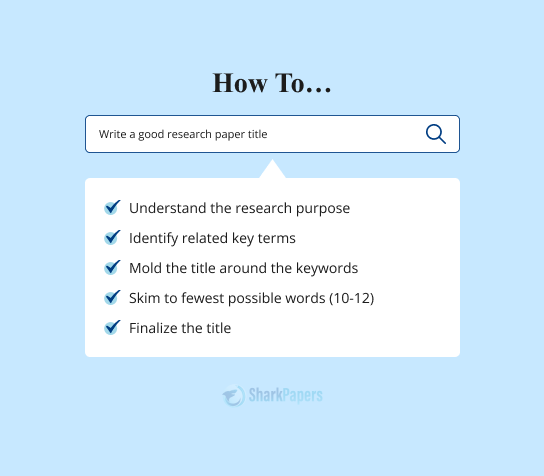
On this Page
Understanding the Importance of Research Paper Titles
Without a proper title that accurately captures the essence and purpose of your research, the paper is almost useless. The importance and significance of a title that strikes the perfect balance between clarity and creativity cannot be overstated.
Here is why a good research paper title is important:
- First Impression: A good title always leaves a positive first impression, influencing the readers to give your paper a thorough read.
- Provides Clarity: It provides a clear idea of your research topic without needing to read the entire paper.
- Relevance : It communicates the importance of your research and its contribution to the field.
- Searchability : Well-chosen keywords make your research easier to find in databases and online searches.
- Innovation : Creativity in the title hints at the innovative nature of your research.
- Professional Impact : A strong title positively influences how your work is perceived by editors and peers.
- Tone Setting : It gives readers a preview of your writing style and the overall approach of your study.
- Academic Identity : A memorable title contributes to your research's identity, making it more likely to be remembered and cited.
Characteristics of a Good Research Paper Title
Here are the 7 common characteristics of a good research paper’s title.
- Provides clarity
- Is relevant
- Includes keywords
- Provides specific details
- Targets the audience
- Doesn’t mislead
Now, let’s understand how to write a research paper title in 5 straightforward steps.

Paper Due? Why Suffer? That's our Job!
5 Easy Steps for A Perfect Research Paper Title
We have broken down the process of crafting strong research paper titles into 5 simple steps.
Here are the research paper title writing steps:
Step 1. Understand the Purpose of Your Research Paper
Making a title that catches attention and tells a story is important, and to do that, you need to know why you're making it. Consider the following questions to understand the purpose of your title:
- What is the central theme of my research?
- Why is my research significant?
- Who is the intended audience for my research?
- What sets my research apart or makes it innovative?
- How can I summarize my research concisely?
Settle down, take your time, and try to answer all these questions. Soon, you’ll be able to have a clear starting path to craft a perfect title for your research paper.
Let’s take an example, and we’ll adjust the questions accordingly.
The title is too long. To start the process of making it concise, answer these questions.
After you’ve found the answers to these questions, you can narrow down your title in the next step after finding the relevant keywords. Let's look at how to accomplish that.
Step 2. Identify Key Terms Related to Your Research
In this step, pinpoint the essential terms that encapsulate the core and scope of your study. Think of these terms as the building blocks of your title, representing the key concepts and focus of your research.
Choose terms that straightforwardly capture what makes your work unique.
For example, in the above sample title that relates to mental well-being for urban citizens, some key terms are:
- Urban residents
- Comprehensive survey
- Daily physical activity
- Mental well-being
- Positive correlation
- Improved mental health
You can turn to modern techniques like using search engines and Google Scholar to find relevant keywords. Such key terms have the potential to boost the online visibility of your paper.
Step 3. Mold Your Title According to the Relevant Keywords
Here is a skimmed-down title that we’ve achieved by shifting some words around, and using the proper syntax:
The title is getting closer to the final stage, but it is still too long. Read the next steps to create a working title for your research document.
Step 4. Skim to The Fewest Words Possible
Short and sweet is the golden rule for a suitable and good research paper title.
Here is how you should keep your title concise:
- Remember that the title is a concise and attention-grabbing piece of text that immediately grabs the reader’s interest
- Trim away any unnecessary details that don't contribute to the core message
- Your title should summarize the intent of your research study effectively
- Avoid using complete sentences in the title
- Use phrases to keep it concise and to the point
For example, the title we crafted in the last step is still quite long. Using the guidelines given above, we can skim it down to:
Typically, a title under 12 words is ideal. Keeping your title concise and using the fewest possible words has the highest chance of capturing the reader's attention. Avoid using any unnecessary words that add length to the title.
Now, to polish this title to perfection, move on to the next step.
Step 5. Finalize Your Title
Once you've trimmed down and adjusted your title, get feedback from others. Is it clear? Does it make them curious? Polish until your title shines like a beacon, inviting people to explore your research.
After feedback, your final title could be:
This final version aims to be clear, concise, and captivating. It sparks interest and urges readers to dive into the details of urban well-being and the impact of daily activity on mental health.

Tough Essay Due? Hire Tough Writers!
Examples of Research Paper Titles
Getting help from practical examples of good research paper titles will help you understand better.
We’ve collected some research title examples here. The following table evaluates the titles on certain factors. A good title should satisfy the complete criteria in the table below:
What is a Research Paper Subtitle?
A research paper subtitle is an additional, explanatory phrase or brief statement that follows the main title of the research paper. Although not a necessity, It provides more context, clarification, or additional information about the study.
Typically, subtitles are common in social sciences research papers. Here are some examples of research paper subtitles.
Main title : “Exploring Dark Matter in the Universe” Subtitle : “Quantum Mechanics and Observational Evidence in the Search for Elusive Cosmic Components”
Main Title : “Neurobiological Mechanisms of Memory Formation” Subtitle : “Examining the Role of Synaptic Plasticity and Neurotransmitter Release in Learning Processes”
Main Title : “Impact of Virtual Reality on Learning Outcomes” Subtitle : “An Experimental Study Assessing the Effectiveness of Immersive Educational Environments in STEM Education”
Main Title : “Inclusive Design for Human-Computer Interaction” Subtitle : “User-Centered Approaches and Accessibility Considerations in Crafting Technological Solutions for Diverse Populations”
Main Title : “Youth Civic Engagement in the Digital Age” Subtitle : “A Comparative Study of Online Activism and Traditional Participation Among Urban and Rural Adolescents”
Some Tips on How to Write a Good Research Paper Title
Although we have covered every writing step in crafting a research paper title, keeping in mind some tips is a good idea as well. Follow these tips to make sure your title is as perfect as it can be:
- Always mold your title toward the target audience
- Choose the language that aligns with the style and tone of your paper
- Don’t end your title with a period (.), as it is not a sentence
- Do not use overly complex words in the title
- Make sure your title accurately represents the intent of your paper
- Use active verbs to convey action or intent
- You can also include a reference to the thesis in your title
- Provide specific details about your focus, methodology, or findings
To wrap things up, writing a title for a research paper is considered one of the most challenging tasks in research writing. Choosing a title that accurately portrays your research work, its focus, and its aim isn’t an easy task.
With our detailed guide on how to craft a captivating research paper title, you can give your research paper an edge. From the initial draft to the final polishing of the title, you can write a great title with a little effort.
However, if you still find it rather challenging to give your paper a suitable title, don’t worry, we have a solution for that as well. This is where our expert writers come to play.
You can reach out to our paper writing service online and tell us exactly what you require. Our professionals have what it takes to craft winning papers.
Get custom research papers from us at the most affordable rates today!
Frequently Asked Questions
How do i write a good scientific research paper title, abstract, and keywords.
Title : Clearly convey the main focus, be concise, use relevant keywords for searchability. Abstract : Summarize research objectives, methods, results, and conclusions concisely; emphasize significance; avoid jargon. Keywords : Identify core concepts, consider likely search terms, use accepted terminology, be specific to enhance discoverability.
How to write a research paper title page?
Follow these steps:
- Center the title at the top.
- Include author names and affiliations below
- Add a running head if needed.
- Place the page number in the top right
- Use a readable font and follow citation style guidelines
How to write a science report title?
Crafting a science report title involves clearly stating the subject, being concise with key terms, considering audience and style, and adhering to formatting guidelines.
How to make a research paper title page in MLA style?
- Place the title at the center, avoiding bold or underlining
- Below the title, include your name, instructor's name, course, and date, aligned to the left
- Use a readable font (e.g., Times New Roman) in 12-point size
- Double-space all text
- Do not use a separate title page unless instructed otherwise; include this information on the first page of your paper
How to write a title for a lab report?
Crafting a lab report title requires clarity and conciseness. Clearly state the experiment's focus, use key terms, and include relevant variables. Follow any provided formatting guidelines for precision.
What is the best title for a research paper?
There is no universal “best” title for a research paper, as it depends on the specific content and focus of the study. The title should accurately reflect the research topic, be concise, and spark interest.

Donna writes on a broad range of topics, but she is mostly passionate about social issues, current events, and human-interest stories. She has received high praise for her writing from both colleagues and readers alike. Donna is known in her field for creating content that is not only professional but also captivating.
Was This Blog Helpful?
Keep reading.
- Learning How to Write a Research Paper: Step-by-Step Guide
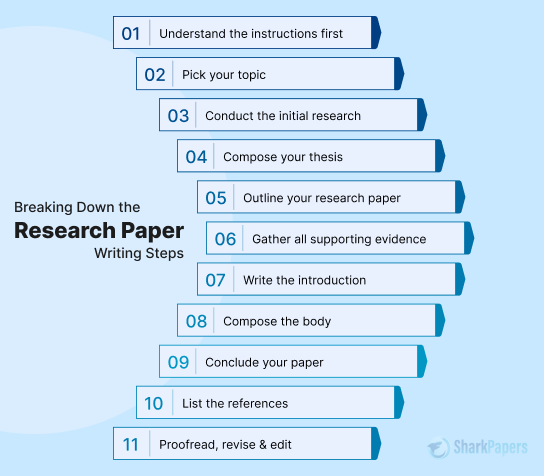
- Best 300+ Ideas For Research Paper Topics in 2024

- A Complete Guide to Help You Write a Research Proposal

- The Definitive Guide on How to Start a Research Paper
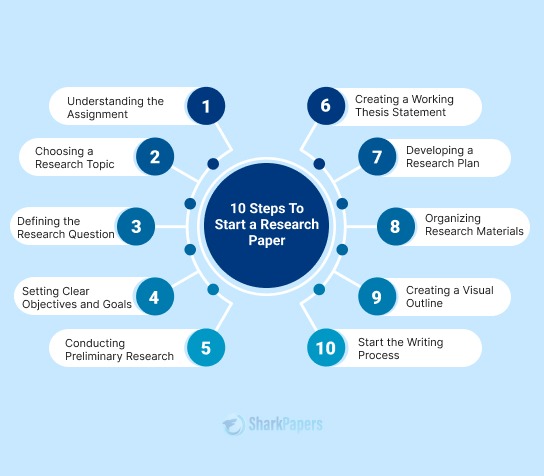
- How To Write An Introduction For A Research Paper - A Complete Guide
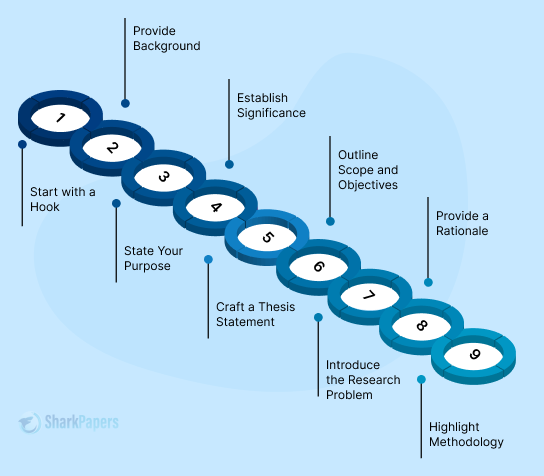
- Learn How To Write An Abstract For A Research Paper with Examples and Tips
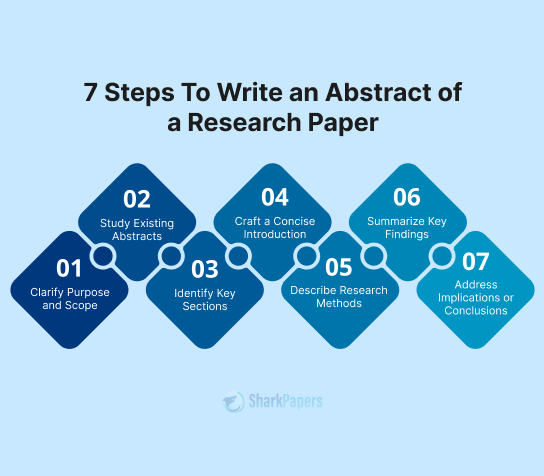
- How to Write a Literature Review for a Research Paper | A Complete Guide
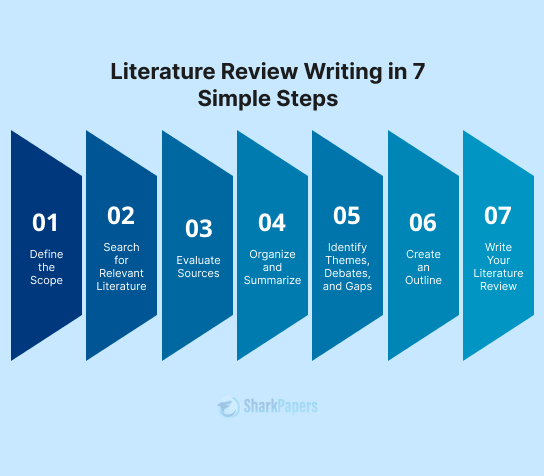
- How To Write The Methods Section of A Research Paper
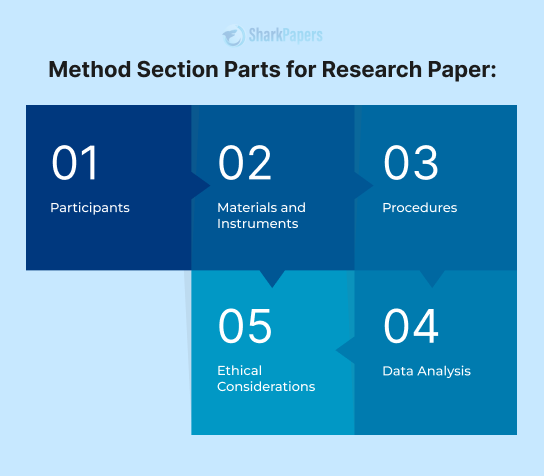
- How to Write a Research Paper Thesis: A Detailed Guide
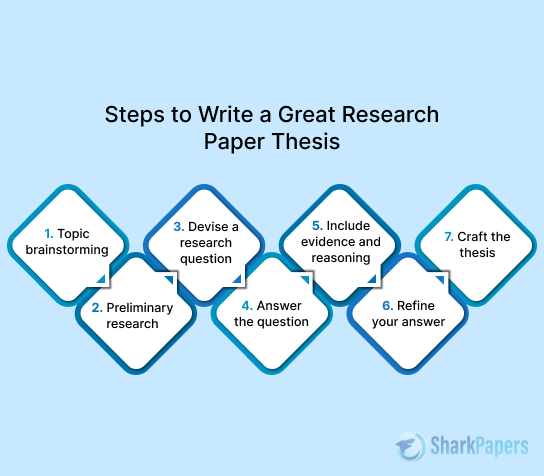
- A Detailed Guide on How To Write a Conclusion for a Research Paper
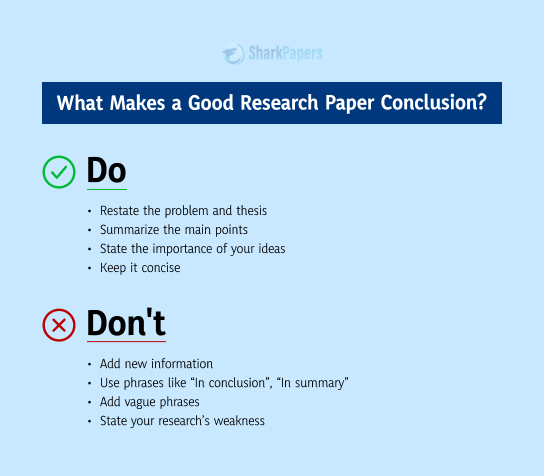
- How To Write The Results Section of A Research Paper | Steps & Tips
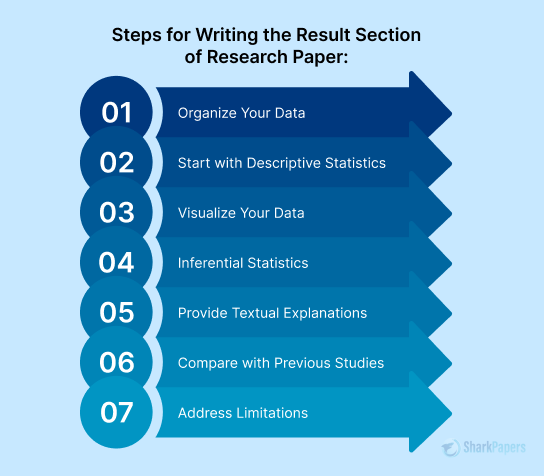
- How to Write a Problem Statement for a Research Paper: An Easy Guide
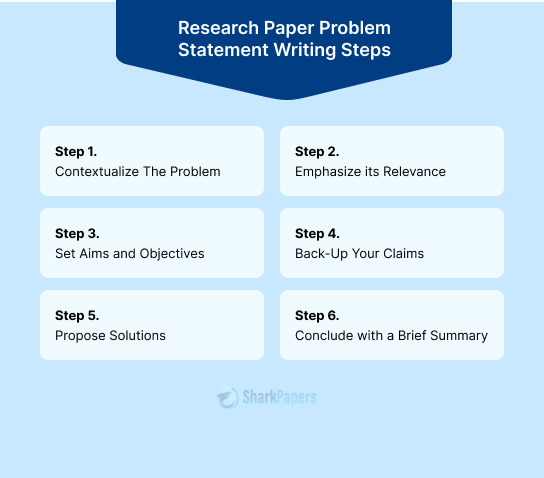
- How to Find Credible Sources for a Research Paper
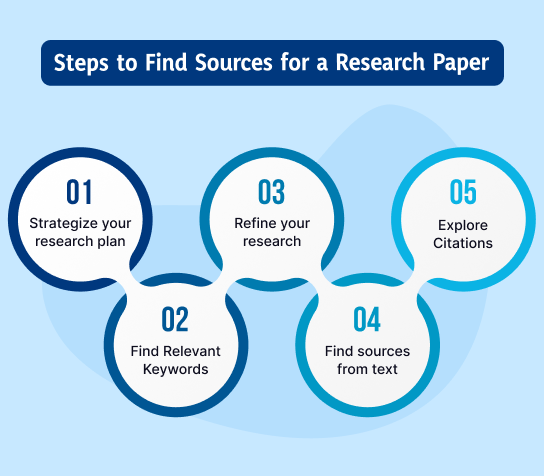
- A Detailed Guide: How to Write a Discussion for a Research Paper
)
- How To Write A Hypothesis In A Research Paper - A Simple Guide
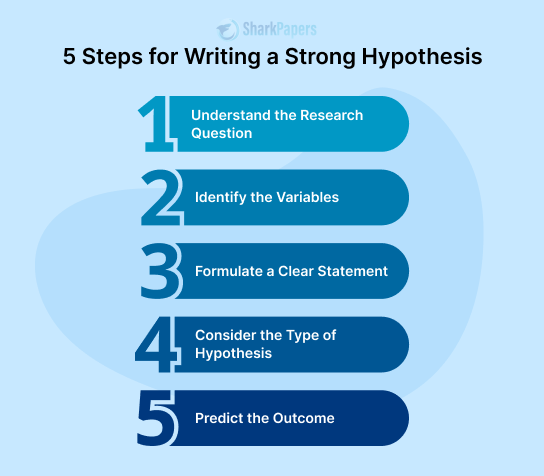
- Learn How To Cite A Research Paper in Different Formats: The Basics
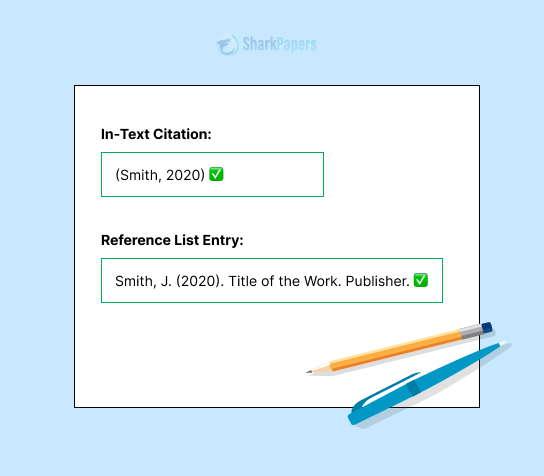
- The Ultimate List of Ethical Research Paper Topics in 2024
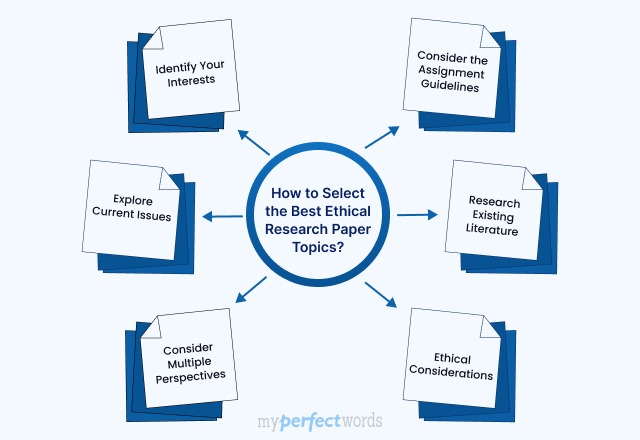
- 150+ Controversial Research Paper Topics to Get You Started
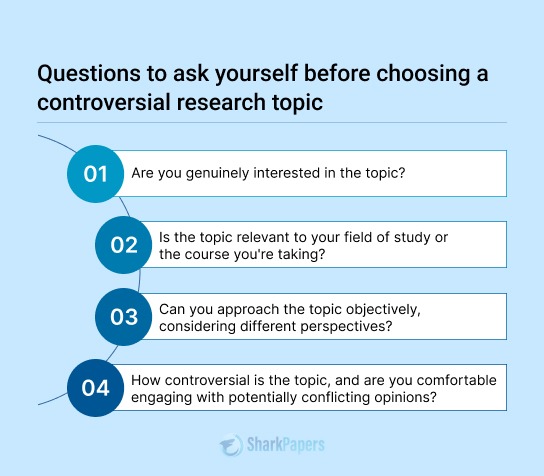
- How to Edit Research Papers With Precision: A Detailed Guide
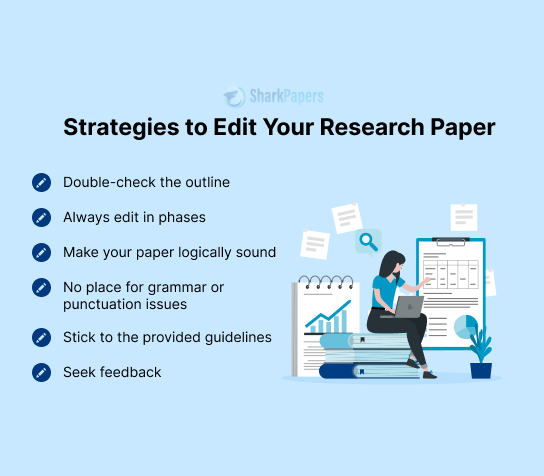
- A Comprehensive List of Argumentative Research Paper Topics
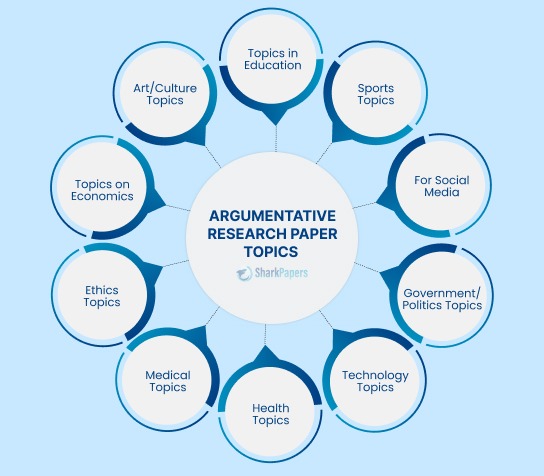
- A Detailed List of Amazing Art Research Paper Topics
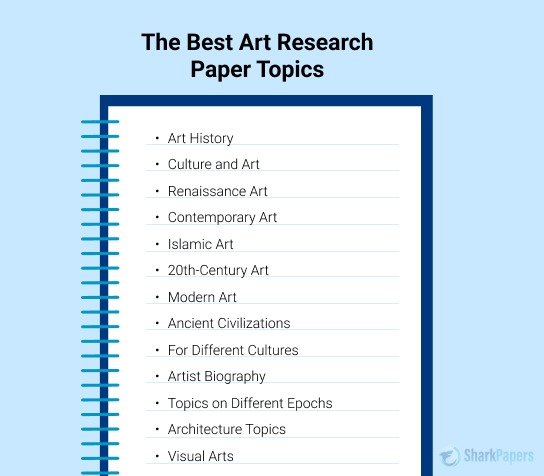
- Diverse Biology Research Paper Topics for Students: A Comprehensive List
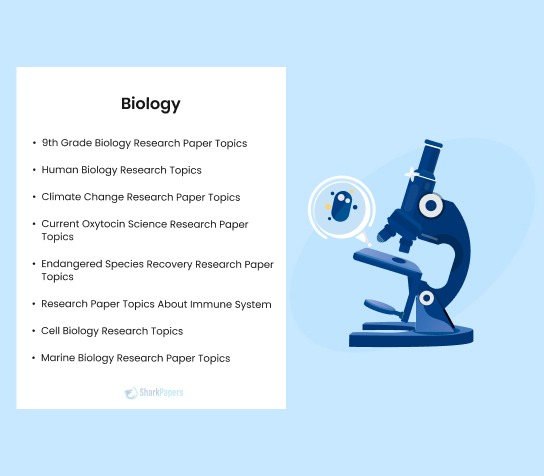
- 230 Interesting and Unique History Research Paper Topics
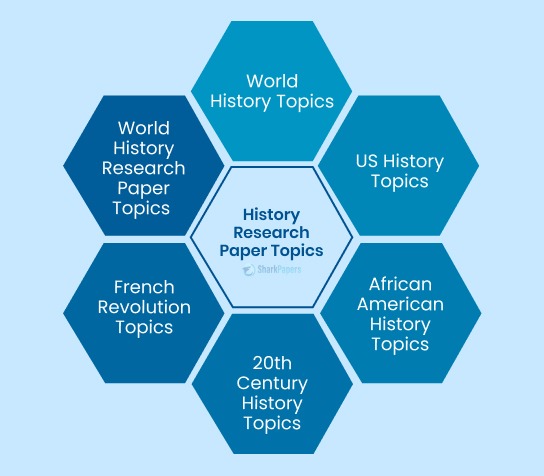
- 190 Best Business Research Paper Topics
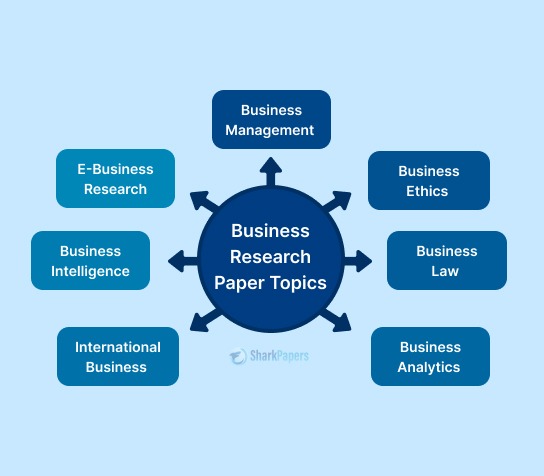
- 200+ Engaging and Novel Literature Research Paper Topics
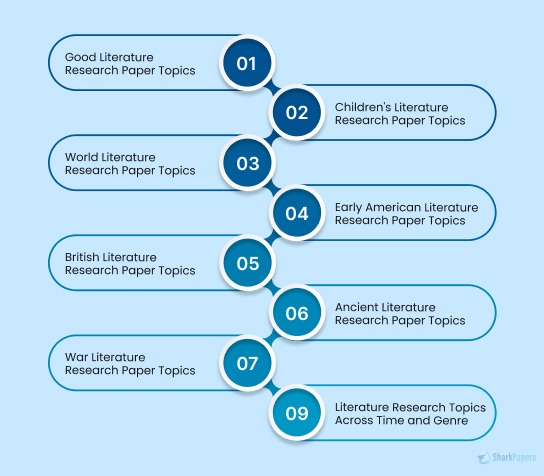
- A Guide on How to Write a Social Science Research Paper
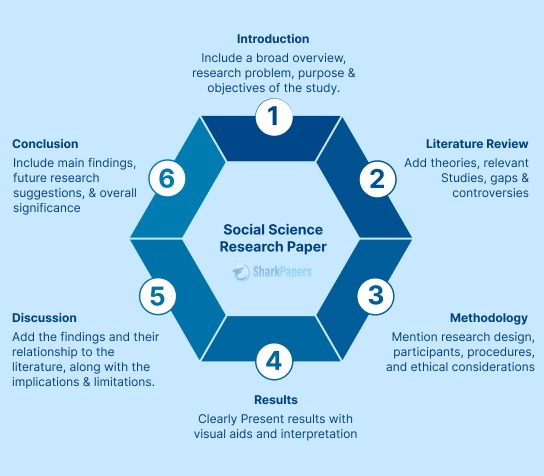
- Sociology Research Papers: Format, Outline, and Topics
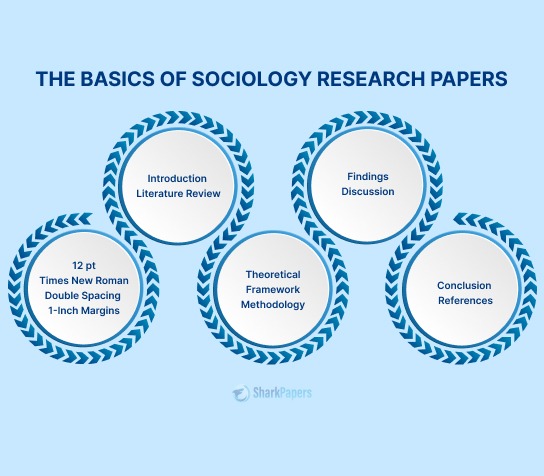
- Understanding the Basics of Biology Research Papers
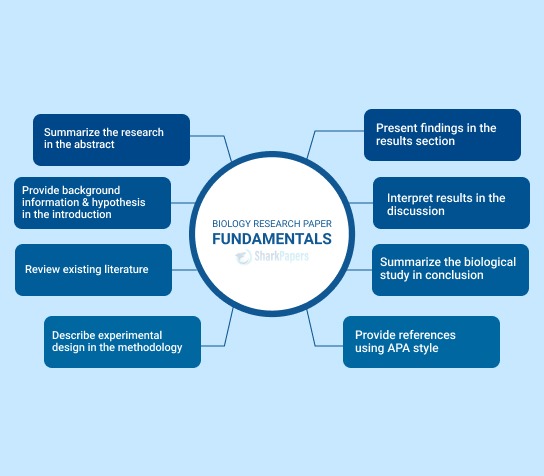
- How to Write a Psychology Research Paper: Guide with Easy Steps
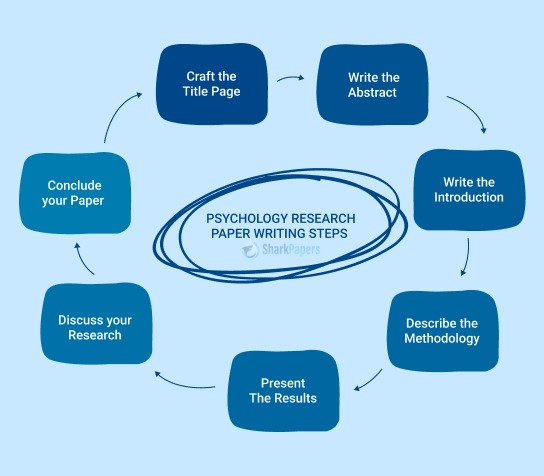
- Exploring the Different Types of Research Papers: A Guide
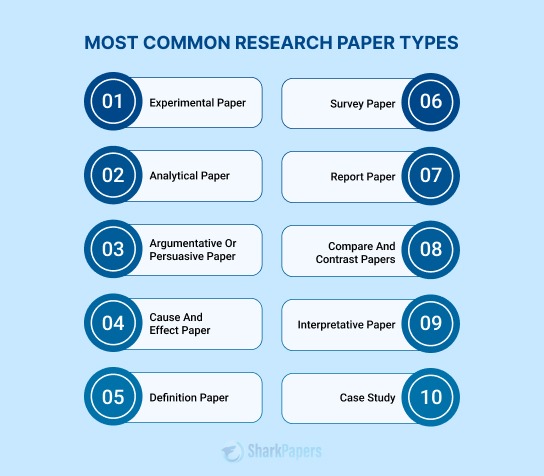
- Scientific Research Paper: Types, Formats, Structure & Writing Process

- Argumentative Research Paper | A Step-by-Step Guide

- Analytical Research Papers: A Detailed Walkthrough

- Experimental Research Paper Explained Comprehensively

- An In-Depth Look at Psychology Research Paper Examples

- 15+ Research Paper Examples for Different Types and Formats

- Free Argumentative Research Paper Examples

- Refine Your Literary Skills with Literature Research Paper Examples

- Get Inspired by 10+ Biology Research Paper Examples

- A Comprehensive Guide to History Research Paper Examples

- An Extensive List of Business Research Paper Examples

- 10+ Best APA Research Paper Examples for Effective Writing

- 10+ Expertly Crafted MLA Research Paper Examples

- Explore 8+ Chicago Research Paper Examples for Academic Excellence

- 15+ Examples of Abstracts for Research Papers

- Exploring IEEE Research Paper Examples: A Practical Guide

- Exploring Research Paper Thesis Examples: A Beginner's Guide

- 10 Free Research Paper Proposal Examples
-12114.jpg)
- A Look at 10 Interesting Art Research Paper Examples

- Survey Research Papers: Types, Format, Writing & Examples

- A Closer Look Into Research Paper Format: APA, MLA, Chicago & IEEE

- APA Research Paper Format 7th Edition: Guide with Examples

- MLA Research Paper Format Made Easy: Step-by-Step Guide

- Formatting Research Paper Title Page in APA, MLA & Chicago

- Crafting the Perfect Research Paper Outline | Steps & Examples

- A Detailed Guide to Chicago Research Paper Format

- An Easy Guide to IEEE Research Paper Format

- 12+ Practical Research Paper Outline Examples for Structuring Your Thoughts

- Engaging Psychology Research Paper Topics for Your Next Project

Struggling With Your Paper?
Get a Custom Paper Written at
with a FREE Turnitin report, AI report, title page, unlimited revisions, and a lot more!
LIMITED TIME ONLY
People Also Read
OFFER EXPIRES SOON!
on 3 Purchases
Valid from 27th Nov to 1st Dec
© 2024 - All rights reserved
Disclaimer: All client orders are fulfilled by our team of experienced, professional writers. The essays and papers we provide are intended to serve as educational tools and reference models only, and should not be submitted as original work.
LOGIN TO YOUR ACCOUNT
SIGN UP TO YOUR ACCOUNT
- Your phone no.
- Confirm Password
- I have read Privacy Policy and agree to the Terms and Conditions .
FORGOT PASSWORD
- SEND PASSWORD

How to Create Research Paper Titles Examples

- X (Twitter)
Last updated on November 12th, 2024 at 05:41 am
A research paper title is your first chance to grab a reader’s attention. It’s like a captivating headline that entices people to delve deeper into the story. But unlike a catchy news snippet, a research paper title also needs to be informative and accurately reflect your study’s content.
Why Does a Research Paper Title Matter?
Often, research paper tittles are overlooked simply because of being poorly constructed.These titles fail to capture the reader’s interest or accurately convey the paper’s essence. Remember, you’ve likely invested weeks or months in your research. Don’t let your hard work get lost in a sea of mediocrity!
A well-written research paper title plays a crucial role in the following ways:
1.Search engines and academic databases rely on research paper titles to index accurately. A clear, keyword-rich title increases the visibility chances of your work being discovered by interested readers.
2. A strong title creates a professional and polished first impression. It shows reviewers and professors that you’ve taken the time to craft a well-structured and informative paper.
3. Research suggests a connection between impactful titles and higher citation rates. A clear and informative title helps readers understand the paper’s relevance to their research interests, making them more likely to cite your work.
Composing a Compelling Title
Creating a captivating research paper title is like writing a mini-headline. that holds a reader’s attention. It should be informative, engaging, and accurately reflect your research. Here’s a breakdown of the process in easy-to-follow steps:
Step 1: Identify Key Eleme nts
Think about your research paper like a puzzle. To create a clear and concise research paper title , you need to understand the different pieces that make it whole. Grab a pen and paper (or your favorite note-taking app) and answer these key questions:
Let’s say your research explores the impact of Artificial Intelligence on large US retail businesses. Here’s how you might answer the questions:
1. Topic: Artificial Intelligence (AI)
2. Focus: Impact on retail businesses
3. Methods: Case study analysis of 100 large US companies
4. Findings: Positive correlation between AI use and increased business volume
Step 2: Identify Your Keywords
Now that you have a clear picture of your research, it’s time to identify keywords. These are words and phrases that capture the essence of your study and will help readers searching for similar topics find your work.
Imagine the questions someone interested in your research might ask. What keywords would they use in an academic database or search engine ?
While you want to attract readers, avoid overly broad keywords. Choose words specific to your research focus. Aim for 3–8 strong keywords.
Building on the Example
Using the answers from Step 1, these would be some potential keywords for the above example:
Artificial Intelligence (AI), Retail Business, Case Study, Quantitative Analysis, and Business Volume.
Step 3: Structure the Title
Your title should be informative, concise, and grammatically correct. Consider the following guidelines:
1. Clarity over Cleverness: While a touch of creativity can be engaging, ensure the title communicates your research.
2. Length: Most journals recommend titles between 7 and 13 words.
3. Style: Consult your university or target journal’s guidelines regarding title format and style.
4. Jargon: Avoid overly technical jargon that might alienate readers unfamiliar with the field.
6. Results: While positive findings are ideal, including negative results accurately reflects your research.
7. Capitalization: Capitalize the first letter of each word (except articles, prepositions, and conjunctions).
8. Punctuation: Use colons effectively for subtitles within the title. Avoid unnecessary punctuation.
9. Keywords: Integrate your chosen keywords naturally throughout the title.
10 No Periods : Titles are not sentences and do not require a period at the end.
11. Descriptive Phrases: Consider using a descriptive phrase to highlight the research objective.
Following these guidelines, an appropriate research paper title for the example above will be:
Quantifying the Impact of AI in US Retail Businesses: A Case Study (12 words)
You will notice that this title is concise, informative, and incorporates postive relevant keywords.
Additionally, if you prefer, you can see a visualiztion of this article.
Studies on research paper titles
The importance of resarch paper titles has initiated several comprehensive research studies from all around the world. Some of the notable ones are:
1. In a path-breaking 2020 MDPI study of 200 research papers from diverse disciplines, a direct correlation between research paper titles and their effectiveness was established.
This study unanimously concluded that titles play an important part in conveying the essence of research papers, and this, in turn, prompts the number of times it is ‘ cited’ . [A critical factor in academic research paper writing].
2. According to Google Scholar, the top 100 research papers indexed by Web of Science in 2014, and by Altimetric in 2018, the titles were between 7 and 13 words. This correlation was consistently observed in papers with impactful titles.
3 . In another landmark study, which comprised more than 150,000 papers was submitted to the UK’s Research Excellence Framework (REF) database . The review concluded that:
1. The style of a research paper title impacted the number of citations it would typically receive. In most disciplines, articles with shorter, more concise titles yielded more citations.
2. Among the other important findings were that research paper titles with colons increased the viewership, whereas those with question marks decreased their value. [A research paper provides a solution, not ask a question!]
3. Also, reserach paper titles that were searched most often were optimized to convey the objective of the research effectively and were between ten words, give or take 3 words. [10 ± 3].
FAQ’S
What is a research title example.
It is a concise and to-the-point statement that summarizes the main focus of the research. A good research title is specific, arguable, and supported by the research. Some examples of good research titles include: The impact of social media on adolescent mental health.
What makes a good PhD title?
The Phd title is your first opportunity to let the reader know what your dissertation is about. With just a few words, the title has to highlight the purpose of the study, which can often include its context, outcomes, and important aspects of the research strategy adopted.
By investing time and effort in crafting a powerful research paper title , you unlock a gateway to a wider audience and greater recognition for your work. Remember, your title is a crucial element that sets the stage for your research. By following these steps and keeping your audience in mind, you can create a title that effectively communicates the value of your research and compels readers to explore your work further.
The importance of composing or naming a research paper title can significantly impact its inherent value. No researcher would want all the effort and hard work that went into their respective research and writing to be shelved and lost in oblivion on account of a poor title.
Remember, the absence of an effective research paper title may result in your study never being found by prospective readers.

My journey in academia began as a dedicated researcher, specializing in the fascinating world of biochemistry. Over the years, I’ve had the privilege of mentoring Master’s and PhD students, collaborating on research papers that pushed the boundaries of knowledge. Now, post-retirement, I’ve embarked on a new chapter, sharing my academic expertise through freelance work on platforms like YouTube and Upwork. Here, I investigate the finer points of scholarly research, guiding aspiring writers through the intricacies of formatting, composing compelling narratives, and navigating the publication process.
You May Also Like
Can you cite your paper in your thesis.

What Is Formality in Academic Writing?

15 Different Types of Academic Writing


COMMENTS
In this article, we will guide you through the process of writing an effective research title step-by-step. Research is a critical component of the scientific process, and titles play a significant role in conveying research results to the community.
Writing Guide for Research Paper Titles. Step 1: Identify Key Elements of the Study; Step 2: Decide on the Title Type; Step 3: Incorporate Keywords; Step 4: Keep the Title Concise and Avoid Jargon; Step 5: Revise for Clarity and Impact; Examples of Effective Research Paper Titles; Tips for Writing a Research Paper Title; Common Pitfalls to ...
This article demonstrates how you can write a good title for your research paper by following five simple steps.
Tips for Writing an Effective Research Paper Title. When writing a research title, you can use the four criteria listed above as a guide. Here are a few other tips you can use to make sure your title will be part of the recipe for an effective research paper:
Need help with your research paper title? Learn how to write a good research paper title in 5 easy steps with examples. Get expert tips here!
Writing a standout research paper title is a necessary step to ensure your work gets the attention it deserves. Following the simple tips shared in this guide can help you create a title that is clear, engaging, and perfectly aligned with your research focus.
How to Make a Research Paper Title in 5 Steps. You might wonder how you are supposed to pick a title from all the content that your manuscript contains—how are you supposed to choose? What will make your research paper title come up in search engines and what will make the people in your field read it?
Want to know what makes a good title for a research paper? Read our step-by-step guide to create engaging titles. Get help with examples and writing tips.
Follow these steps to create a perfect title for your paper. What does your paper seek to answer and what does it accomplish. Try to answer these questions as briefly as possible, with one or two sentences each. You can create these questions by going through each section of the paper and finding the MOST relevant information.
Creating a captivating research paper title is like writing a mini-headline. that holds a reader’s attention. It should be informative, engaging, and accurately reflect your research. Here’s a breakdown of the process in easy-to-follow steps: Think about your research paper like a puzzle.